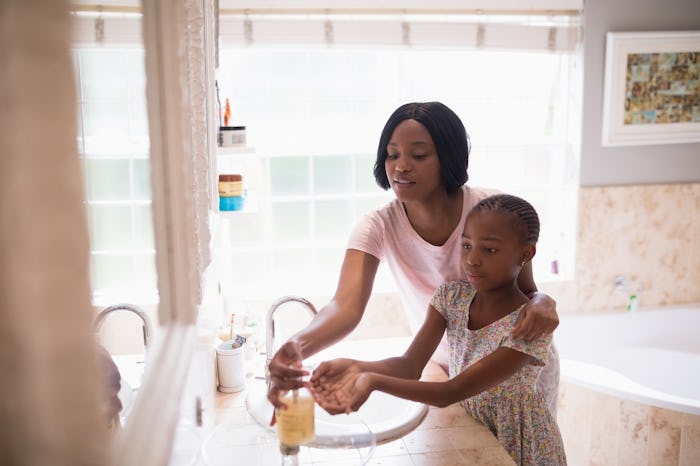Life

How To Encourage Good Hygiene Without Shaming Your Child
I've spent a lot of time considering the words I use with my kids. I remember growing up, and everyone from my teachers to my parents telling me that I was a "bad girl" for several different things, whether it was not brushing my teeth or pinching a friend. The sting of that never left. I don't want that for my kids, but I also want them to be healthy and safe. It's a delicate balancing act, especially when it comes to hygiene. When evaluating how to encourage good hygiene without shaming your child, we have to look at not only the language we choose, but also the consequences of inaction.
Fun aside, as I was writing this, I went into the bathroom at my home. My son had left his toothbrush on the lid of the toilet bowl. I have no idea why he thought to place it here, instead of the standard location, but we are now down one toothbrush, because that went straight into the bin. After I finish work today, I'm headed to Target for some new ones. Trust me, no one is more horrified about this than I am.
I'll admit, finding that gem was not my proudest moment. I may have yelled from the bathroom "Do you like brushing your teeth with poop? Because leaving your toothbrush on the toilet seat is basically the same thing." To which my oh-so-sarcastic 9-year-old responded "Well, you always tell me I'm talking out of my butt, so..." While sarcasm is essentially our love language in the Bowen family, shaming is not. I work every day on refining my speech and actions with my children, so that shame isn't an emotion they're familiar with.
The balance of language and example is key when determining how to encourage good hygiene without shaming your child. Kids are so much smarter than we give them credit for. They pick up on everything. If you're telling your son to floss after breakfast, but he's never seen you so much as pick up the stuff, he's going to be less likely to see the need himself.
The same goes for other hygienic habits like frequent hand washing or doing the dishes. It's not just that, though. How you choose to approach a subject can either serve to make your child feel uncomfortable and shamed or informed and autonomous, noted Psychology Today. With my children, I want them to feel like they know why it's important to wash their hands or brush their teeth, and also, how it maintains the agency over their bodies.
I frequently tell my children the unvarnished truth about germs and viruses and how they breed. We discuss how habits like washing our hands in warm, soapy water gets rid of those germs and makes us less likely to get sick. This approach can be tricky, as it seems like it could possibly swing too far into the territory of the germaphobe, but I find that as long as I'm not using language that incites fear, and instead, using language that informs, I can help mitigate this. For their part, the National Childcare Accreditation Council of Australia agrees.
I never tell my children that they're "dirty" in the pejorative. It's never a "You're so gross," or "Ack, you're dirty," language. If I strike a similar note but not emotion, I'll say something like "You've been at the beach, and holy wow, look how dirty your feet are." Or, "Your hands are probably really germy from playing at the park, why don't you take care of that."
I also allow them to do it for themselves. While I do monitor their ability to clean themselves and their environment properly, giving them the reins of doing it is valuable to their self-worth. If they need correction or guidance, I try to remind them that they're learning, and no one got it right immediately. This is especially true in the case of my 6-year-old with washing and conditioning her very long, very thick hair. It requires a lot of positive talk and helpful tips as I re-condition her tangles, working the comb through.
It's also become a habit. We wake up, wash our hands, eat breakfast, brush our teeth, shower at the same time, clean our spaces — all of that is automated. If it's in instinctual habit, there's no pushback, and fewer instances where shaming them may arise. It's just something you do.
Psychology Today noted that the key between guidance and shame is what your children hear. If they hear options and authority, they're more likely to comply without feeling shamed. However, if the language is negative, and laced in supposition, like "you know better," or "that's naughty," they only hear the no.
Judging by the toilet toothbrush incident of today, I absolutely have room for progress — everyone does. Hopefully, with continued guidance, that won't happen again, and I'll be just as successful in teaching them proper hygiene habits as I have been at honing their sarcasm.
Check out Romper's new video series, Romper's Doula Diaries:
Check out the entire Romper's Doula Diaries series and other videos on Facebook and the Bustle app across Apple TV, Roku, and Amazon Fire TV.